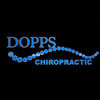Enhancing Respiratory Health: The Role of the T3 Vertebra in Thoracic Spine
- Dr. Rory Dopps

- Apr 28, 2024
- 2 min read

The T3 vertebra plays a critical role in respiratory health as it influences the lungs, bronchial tubes, pleura, chest, and breast. Misalignments in this area can significantly impact respiratory functions, potentially leading to conditions like asthma, bronchitis, or other pulmonary issues.
Symptoms of T3 Nerve Interference
Individuals experiencing issues with the T3 vertebra might face symptoms such as breathing difficulties, persistent coughs, and chest discomfort. These symptoms are often aggravated by poor spinal alignment which can impede optimal nerve function.
Factors Contributing to T3 Misalignment
Misalignment of the T3 vertebra can be caused by several everyday activities and postures, including:
Prolonged sitting with a rounded back, which compresses the chest.
Frequent forward head posture from excessive device use.
Strenuous upper-body workouts without proper form.
Carrying heavy loads unevenly, straining the thoracic spine.
Sleeping on unsupportive mattresses that foster poor posture.
Who is Most at Risk?
Certain professions are more susceptible to T3 issues due to the nature of their work:
Office and remote workers who sit for extended periods.
Manual laborers and warehouse staff.
Fitness enthusiasts who engage in intense upper-body exercises.
Delivery drivers and couriers.
Healthcare professionals like nurses, who often perform physically demanding tasks.
Preventive and Supportive Measures
To mitigate these risks, using an ergonomic office chair can provide crucial support for the upper and middle back, maintaining proper posture and relieving pressure on the T3 vertebra. Additionally, incorporating certain health supplements like Designs for Health's Liposomal Vitamin C can support immune function and aid in maintaining respiratory health, crucial for those with T3-related pulmonary symptoms.
Take Action for Your Health
If you're experiencing respiratory symptoms or chest discomfort, it might be related to your spinal health. Consulting with a chiropractor can offer insights and treatment options tailored to alleviate these symptoms. Visit doppskc.com to schedule an online consultation and learn more about how targeted chiropractic care can enhance your respiratory health and overall well-being. Don't overlook the health of your thoracic spine—take steps today to breathe easier and live healthier.




Comments